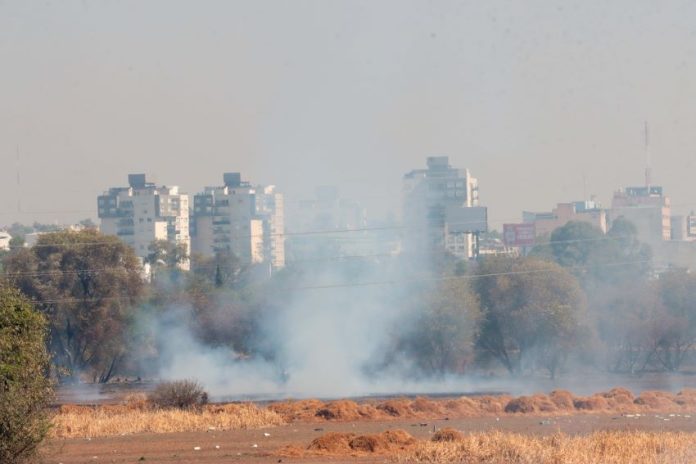A grassy, shrubby basin that serves to catch runoff rainwater from Mexico City is so dried out by central Mexico’s drought and water shortage that it caught fire on Sunday and burned for three days.
Thought to be under control on Tuesday morning, the blaze in the El Cristo basin in México state later reignited and consumed even more dried-up vegetation, bringing the total area scorched to between 30 and 45 hectares — a significant portion of the 118-hectare area.
In a social media post later Tuesday afternoon, state Civil Protection officials declared, “With the support of authorities at all levels, we managed to contain the grassland fire in the El Cristo regulatory basin.” However, a popular Mexico City-area X account noted Wednesday morning that the smell of burning grass continued to linger.
The smell of burnt vegetation wasn’t the only worry. Because El Cristo was a receptacle for sewage for decades, nearby residents have been affected by “intense clouds of smoke,” according to newspaper El Universal. “Pollution by PM2.5 particles composed of highly toxic chemical substances [were] reported by Azcapotzalco authorities,” the newspaper wrote. Azcapotzalco is Mexico City’s northwesternmost borough, adjacent to El Cristo.
El Universal added that classes and activities were suspended at nearby schools, sports complexes and cultural centers, and that firefighters had to shift to another area at one point due to a toxic cloud. The area remained on environmental alert Wednesday for smoke clouds.
The fire occurred at the Vaso Regulador El Cristo, on the border of Mexico City and Naucalpan, México state. “Vasos reguladores,” common sites in Mexico, are regulating ponds or retention basins that help stop flooding by holding excess water from man-made storm drains that are overwhelmed during heavy rains.They can also be used to store water for irrigation, improve water quality by filtering out pollutants and sediments, and provide a habitat for plants and animals.
Debido a la cantidad de humo que emana del Vaso Regulador el Cristo en Naucalpan por incendio de pastizales, incendio que ya fue sofocado, fueron suspendidas las clases en planteles educativos de la zona, incluyendo el CCH Azcapotzalco. pic.twitter.com/URwPmbsdtD
— Reporte Índigo (@Reporte_Indigo) March 5, 2024
Videos posted to social media show the smoke that covered the surrounding areas
El Cristo captures runoff water from Mexico City and its neighbors, which are situated in high mountain valleys with no natural outlet.
Under normal conditions, El Cristo is lush with greenery and has enough standing water to be called a lake. In past years, people would come to the site to go kayaking, take a stroll or enjoy a family picnic.
But with below-average rainfall in 2023, and drought conditions that have been intensifying over the past four years, Mexico is experiencing a water crisis. Three reservoirs that provide the Mexico City metropolitan area with 25% of the water for over 23.5 million residents are at about one-third of capacity. In October, Mexican officials began restricting water from those reservoirs by roughly 8%, and enacted an additional 25% cut in November.
With reports from El Universal, AP and La Jornada
